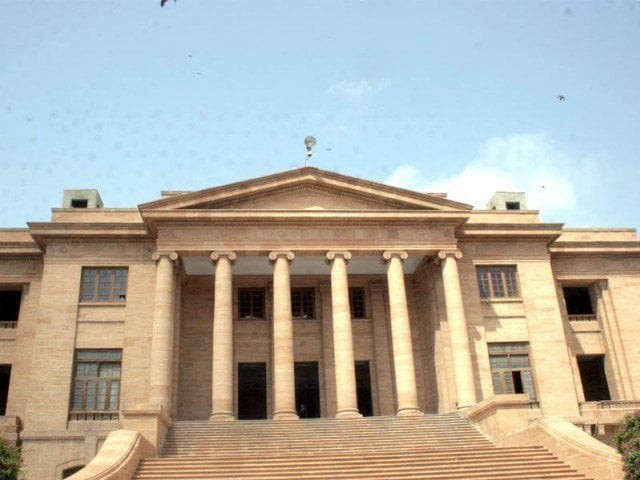Verdict on prisoners’ appeals to be announced within a week: SHC CJ
CJ also directed the Sindh govt to release Rs330m for the penalties within three days

CJ also directed the Sindh govt to release Rs330m for the penalties within three days. PHOTO: FILE
A two-member bench, comprising CJ Ahmed Ali Sheikh and Justice Omar Sial, was hearing the pleas seeking release of inmates and non-payment of penalty sum on Wednesday.
Plaintiff Advocate Shahab Asto maintained that it was the question of poor peoples' lives, then why was the government delaying the payment? To which, Additional Advocate-General Mustafa Mahesar replied that despite the approval from cabinet, the funds couldn't be released due to bureaucratic hindrances.
Sindh home department deputy secretary informed the court that four out of 37 inmates have filed review appeals against the trial court's decision. Hence, the decision to release funds should be delayed until the verdict on the pleas is given.
Advocate Asto asked that until the verdict was given, will the rest of the people rot in jail? The inmates who have filed appeals had also completed their terms.
The CJ directed the bench hearing the appeals of four inmates to announce the verdict within a week. Home department deputy secretary informed that prisoner Allah Bakhsh, Irfan, Muhammad Aslam and Hanif's penalty sum combined is more than Rs140 million.
Court directed to release Rs330 million, sum of penalties on all 37 prisoners, within three-days and adjourned the hearing till May 10.
Acquitted after 23 years
The SHC, accepting the appeal moved against the death sentence for abducting and murdering a girl, announced the decision and acquitted the accused after 23 years. A two-member bench, comprising Justice Naimatullah Phulpoto and Justice KK Agha, announced the decision on Wednesday in which the accused, Muhammad Sabir, was acquitted.
According to the prosecution, the accused abducted Fauzia in Bhawalpur on Novemeber 29, 1995 and had brought her to Karachi. An accomplice, Zahoor, had disclosed the abduction of the girl in 1996 and fled after securing bail in the case. Sabir murdered Fauzia on her refusal of marriage and hid her body.
SHC displeased with authorities’ failure to recover missing persons
Malir's additional district and sessions judge had awarded death sentence to the accused. The defending lawyer maintained that the police forced Sabir for the confessional statement, which holds no legal importance.
Missing girl recovered
The police produced the recovered minor girl, Sania Munawar, who had been missing since four and a half years, before the same bench while it was hearing pleas for the recovery of missing children.
Crime Investigation Agency (CIA) Deputy Inspector-General (DIG) Arif Hanif informed that the girl used to work in a house but she left that place because she was tortured by the family members. A man named Haris Aftab took her to Sheikhupura from Karachi. He left her with his relatives' family in Sheikhupura when the news of missing children started circulating. The family who tortured the girl and the accused who took her with him are being challaned.
The court remarked that the story made up by the police was not believable as they have only been able to recover one girl since the court issued the directives. The court ordered the police to immediately recover other 16 children with the use of modern technology and submit a report till May 29.
Bail pleas accepted
The SHC accepted the bail pleas of Darul Sehat Hospital (DUSH) owners Amir Chishti and Farhan Ali in Nashwa death case.
A single bench comprising Justice Salahuddin Panhwar was hearing the bail pleas on Wednesday in which DUSH owners appeared before the court. The court accepted the bail pleas of the accused against the surety of Rs50,000 each.
Justice Panhwar remarked that the accused should appear before the trial court within ten days. Both accused had escaped from a local court on May 7 when their bails were rejected.
Shahid Afridi's book
The same bench declared the petition seeking ban on Shahid Afridi's book 'Game Changer' maintainable and sought arguments from parties on next hearing.
The court asked the petitioner what connection he had with the players who were insulted and how was he affected by the book.
The petitioner, Abdul Jalil Khan Marwat, maintained that national heroes were insulted and he had filed the petition in the capacity of being a cricket fan because objectionable terms such as "suicide attacker" have been used in the book.
The court remarked that if a ban on the book is sought then a civil suit should be filed as such issues cannot be heard in a constitutional petition. The petitioner should come to court after reading Article 199 of the Constitution about the jurisdiction of high court, the court remarked.
The petition maintained that Shahid Afridi, in his book, used terms such "small man" for Javed Miandad, "mediocre captain and terrible coach" for Waqar Younis, "saryal means burnt up" for Gautam Gambhir and other derogatory and insulting words for legendary cricket players. By doing this, he has hurt the game and the fans. Afridi also mentioned that his year of birth is 1975 while PCB, ICC and other organisations marked him the 16-year-old who had made the fastest century in 1996. If he was born in 1975, that would make him 20 or 21 years old when that record was made. Shahid Afridi and Wajahat Saeed Khan should be stopped from publishing the book and offensive words should be removed, the petition asked.
Published in The Express Tribune, May 9th, 2019.



















COMMENTS
Comments are moderated and generally will be posted if they are on-topic and not abusive.
For more information, please see our Comments FAQ